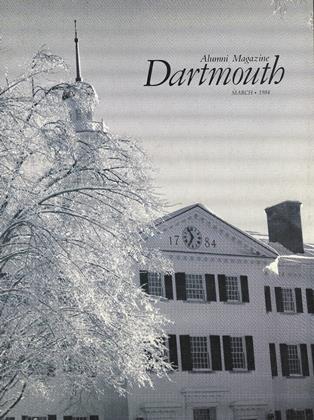Two years after a headline-making conference on alcoholism at Dartmouth, the College sponsored another similar conference. The difference was that this conference, held January 24-27 at Collis Center, touched on abuse of other drugs as well as alcohol and was initiated and planned by students. Ironically, student turn-out at the series of panels, films, and workshops was low. Steve Nelson, director of the Collis Center and chair of the Alcohol Concerns Committee, commented in The Dartmouth: "It is ever difficult to lead those who may need it most to engage in reflection about their relationship to alcohol and other drugs."
At the faculty and administrator panel moderated by Nelson, Donald Pease, professor of English, said that talking about a liberal arts education independent of the social situation is "to turn liberal arts into a travesty." He said the image of the Dartmouth student who works hard in the classroom and plays hard outside of the classroom is "a coin that has been minted and re-minted for hundreds of years."
Ronald Green, professor of religion, said students do not learn how to use alcohol responsibly at Dartmouth and suggested having student-faculty parties where drinking was not the focus. Marilyn Baldwin, associate dean of the College, said that the vast majority of discipline problems on campus are alcohol-related.
At a student panel, moderated by Norman Carpenter '53, Josh Bornstein '83 recalled a comment he heard that alcohol had become Dartmouth's "Hinckley defense," excusing the destructive behavior of drunken students. Many members of the student panel felt that fraternities are most often the places on campus where alcohol is abused. A kind of "mob psychology" often takes over at large fraternity gatherings, according to Lucia Jackson '84.
Cocaine use was also repeatedly mentioned as an issue at Dartmouth which needs to be addressed. Hank Erbe '84 called Dartmouth a microcosm of society at large in that regard.
At an athletic panel, moderated by Athletic Director Ted Leland, professional and former college stars said that pressure, high income, and sometimes free time and pain are factors contributing to drug abuse. Reggie Williams '76 of the. Cincinnati Bengals, said students should know their options about getting help on campus. E. J. Junior of the St. Louis Cardinals, one of four players suspended because of drug involvement, said he realized in rehabilitation that he had a disease, not just a problem. Murry Bowden '71, who captained Dartmouth's undefeated football team in 1970, said he thought it was positive that athletes were coming forward in the national media to tell their stories: "These fallen giants may be beneficial to society at large."
The majority on an alumni panel, moderated by President David T. McLaughlin '54, said they were not sure Dartmouth had anything to do with their alcoholism. Hartley Webster '6l pointed out that his twin brother who went to Princeton is also a recovering alcoholic. Mike Hey1 '74 said Dartmouth "incubates" alcoholism but that he now realizes he was alcoholic at age 15. He said he ran with the "hell-raisers" in college so he wouldn't have to look at himself as worse.
Several of the alumni praised the Dartmouth community for its willingness to discuss the issue. According to McLaughlin, the awareness of alcohol abuse is "a priority of the institution." Citing the polarization of the campus between the academic and the social, he said he hoped the residential clustering proposal and the undergraduate advising program will improve the quality of student life. "We're a long way from it but I think you have to have an ideal [to strive for]," he said.
 View Full Issue
View Full Issue
More From This Issue
-
 Feature
FeatureBraving the Alps
March 1984 By Jack Aley '66 -
 Feature
FeatureShaping Public Policy: The Washington Internship Program
March 1984 By Frank Smallwood '51 -
 Cover Story
Cover StoryA New in the Neighborhood
March 1984 By Debbie Schupack '84 -
 Feature
FeatureThose Championship Seasons
March 1984 By Brad Hills '65 -
 Article
ArticleThe Price of Art
March 1984 By Monica Louise Latini '84 -
 Class Notes
Class Notes1963
March 1984 By Harry R. Zlokower
Article
-
 Article
ArticlePROMINENT CITIZENS MOURN DEATH OF GENERAL STREETER
February, 1923 -
 Article
ArticlePhi Beta Kappa
December 1935 -
 Article
ArticleCivilian Enrollment Up
August 1945 -
 Article
ArticleThe Brains Behind "Gunsmoke"
October 1959 -
 Article
ArticleMosbacher Again at the Helm
May 1962 -
 Article
ArticleOUTDOOR EVENING
March 1936 By H. T. A. Richmond '38

